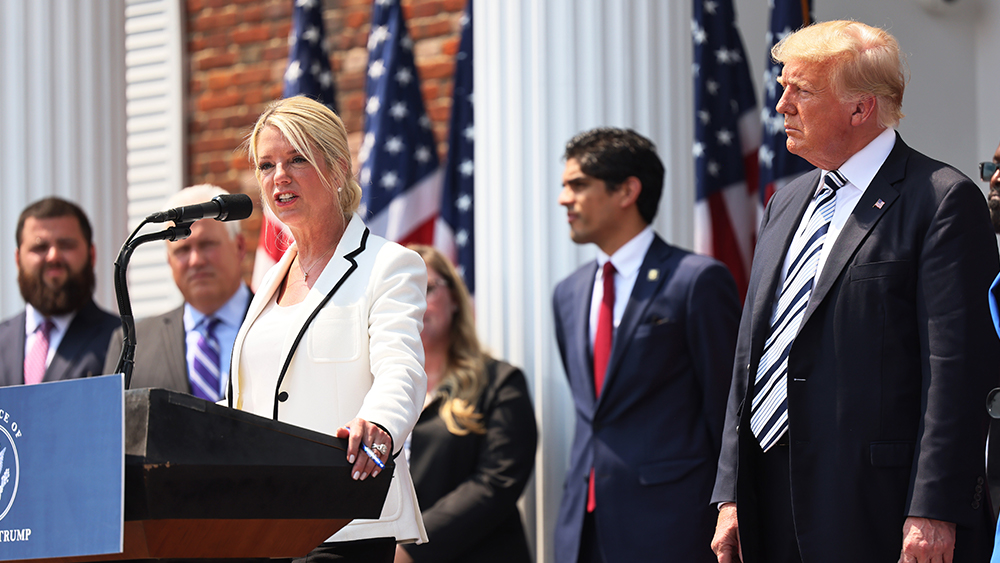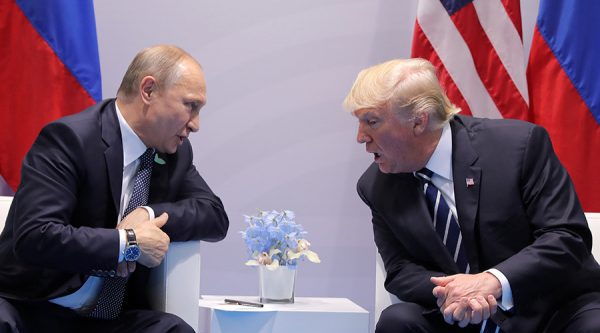 Parler
Parler Gab
Gab
- The probability of Bitcoin (BTC) dropping to $75,000 has doubled to 22% within a week, driven by President Trump's aggressive tariff policies.
- Trump's tariffs of 25% on Canadian and Mexican imports and 10% on Chinese goods have rekindled a global trade war, potentially leading to higher inflation and market instability.
- Cryptocurrencies, particularly Bitcoin and Ethereum, have experienced significant drops, with Bitcoin declining 11% and Ethereum hitting its lowest level since August 2023.
- Bitcoin's double top pattern and technical indicators suggest a potential drop to $75,000, while the broader outlook remains constructive with the possibility of ETF approvals and strategic BTC reserves.
- The Federal Reserve may intervene to curb the dollar's rise and prevent further tightening, but this raises concerns about long-term inflation risks and the potential shift towards alternative assets like Bitcoin.
Tariffs and inflation: A dangerous combination
The renewed trade war has sent shockwaves through global markets, with cryptocurrencies bearing the brunt of the sell-off. Bitcoin, often touted as a hedge against inflation, has dropped 11% in just four days to 93,700, while Ethereum (ETH) has fallen below 2,200, its lowest level since August 2023. "The recent tariffs imposed by Trump are likely to lead to increased inflation, which could dampen investor sentiment in crypto markets," Derive noted in an email. Andre Dragosch, head of Europe at Bitwise, echoed this sentiment, stating on X that the tariffs are "sending shock waves via USD strength & contraction in global money supply." Historically, tariffs have been a double-edged sword. While they aim to protect domestic industries, they often lead to higher consumer prices and retaliatory measures from trading partners. The 2018 trade war, for instance, saw the S&P 500 drop 9% before rebounding. This time, the tariffs target $1.3 trillion worth of goods — seven times the value of the 2018 tariffs—making the situation far more precarious. Geo Chen, a macro trader and author of the Fidenza Macro newsletter, warned that the tariffs could remain in place for months, with the risk of escalation. "The best we can hope for is a partial rollback of tariffs once negotiations conclude," Chen said.Bitcoin's double top: A bearish signal
From a technical perspective, Bitcoin appears to be forming a double top reversal pattern, a bearish signal that could open the door to a drop to 75,000. Arthur Hayes, chief investment officer of Maelstrom and former BitMEX CEO, has also predicted that BTC will first drop to around 75,000 before staging a larger bull run. Despite the short-term bearish outlook, the broader picture for Bitcoin and cryptocurrencies remains constructive. Derive highlighted the growing momentum for creating strategic BTC reserves in several U.S. states and the potential approval of spot ETFs for assets like DOGE, SOL, XRP and LTC. "If the SEC approves these, it will signal greater legitimacy for the digital asset industry and trigger more capital inflows, potentially driving prices upward," Derive told CoinDesk.The Fed's role: A potential lifeline
As the trade war intensifies, all eyes are on the Federal Reserve. Dragosch expects the Fed to eventually step in to curb the dollar's rise and prevent further tightening in financial conditions. "At some point, the Fed will need to reignite QE to stop a continued deceleration in global growth," he noted. For conservatives, this raises concerns about the long-term consequences of monetary intervention. While quantitative easing (QE) may provide short-term relief, it risks exacerbating inflation and undermining the dollar's value—a scenario that could further erode confidence in traditional financial systems and drive investors toward alternative assets like Bitcoin.What lies ahead?
The coming weeks will be critical for both traditional and crypto markets. As Trump's tariffs take effect and trading partners retaliate, volatility is likely to persist. Crypto traders are bracing for further downside, with one anonymous trader cautioning, "Despite the talk of deals, this move doesn't feel temporary." For conservatives, this moment underscores the importance of sound economic policies that prioritize free trade and market stability over protectionism. While Bitcoin's long-term prospects remain promising, the immediate future is fraught with uncertainty. As the trade war unfolds, investors must remain vigilant and prepared for further turbulence. In the words of Derive, "The broader outlook remains constructive." But for now, the storm clouds are gathering, and the path ahead is anything but clear. Sources include: CoinDesk.com Binance.comTrump and Putin agree to Ukraine peace talks, with potential meeting in Saudi Arabia
By Cassie B. // Share
THE PRICE OF PEACE: Klitschko warns of chaos as Ukraine conflict nears end
By Willow Tohi // Share
USAID tied to Trump’s 2019 impeachment, Shellenberger reports
By News Editors // Share
The golden gamble: Is a historic gold revaluation imminent?
By Willow Tohi // Share
Europe braces for influx of Ukrainian soldiers with PTSD: A looming crisis
By Willow Tohi // Share
Governments continue to obscure COVID-19 vaccine data amid rising concerns over excess deaths
By patricklewis // Share
Tech giant Microsoft backs EXTINCTION with its support of carbon capture programs
By ramontomeydw // Share
Germany to resume arms exports to Israel despite repeated ceasefire violations
By isabelle // Share










